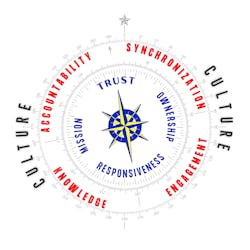Getting Your Teams On-Purpose
Make Sure Your Team OPTS IN
Wouldn’t it be great if your teams performed optimally on a regular basis as opposed to getting it right just some of the time? This is what we call performing “On-Purpose”, rather than accidentally, where they get it right from time-to-time.
The fundamental principle to getting teams to opt in is getting everyone to understand that a team is much more than a group of people working together towards a common goal. It has often been said that there is no “I” in team. In fact, a high performing team includes individuals (the “I”) that are surrounded with other like-minded individuals. It all begins with four individual-focused characteristics and four team-focused traits:
1. TRUST
The most common type of trust is called predictive trust—where leaders and team members can rely on each other to do what they have been asked to do. This is a critical foundation with any team.
Beyond predictive trust is vulnerability trust. Vulnerability is often thought by many to be a weakness. Nothing is further from the truth. Being vulnerable is a powerful strength. When everyone on the team allows themselves to be vulnerable, the team becomes stronger.
To help your team with this, use the simple exercise below with your team leaders. Then have them use it with their teams. The exercise is simple—in their groups, they answered the following four questions:
- Where did you grow up?
- How many siblings do you have and where do you fall in the birth order?
- What was an important or unique event (positive or negative) in your childhood before the age of 18?
- How has that event impacted your professional life today?
This exercise takes time, yet it is a powerful tool that will make a huge impact on team development.
2. RESPONSIVENESS
Successful teams communicate with each other. This does not mean they always agree—in fact there are often disagreements. Those disagreements are based around ideas and there is nothing personal, or any personal attacks, on or against others in the group.
This level of communication allows teams to be genuinely responsive to colleagues, subordinates, managers, other teams, customers—in other words, all stakeholders. They are responsive and do not avoid difficult conversations.
3. OWNERSHIP
The top teams have individuals who all take ownership for everything they do. When they make a mistake, they do not place blame, they do not ignore the mistake, they own the mistake and learn from it, and help others learn as well. On the other side of the coin, when they do something successful, they share that success with their team members. This must be done in a non-braggadocio’s manner.
4. MISSION
Every organization has their mission statement—this is not what our word “Mission” means. The individuals on successful teams all have a unique passion for the specific mission for their specific team.
The power behind the passion for the team’s mission is to make the position of each team member more personally fulfilling. When the position is more fulfilling, it makes the position more fun. When the position is more fun, we want to do more to help our team succeed.
Next are the traits that each team should focus on. How we approach and employ these traits will, naturally, be slightly different for each team.
5. ENGAGEMENT
Studies show that employee engagement today is at one of the lowest levels in years. It is critical for team members to keep each other engaged. There will always be someone who is struggling with something, either personally or professionally, on any given day. When team members recognize this, they can step in and help.
One employee may not have all the knowledge necessary, and when others help, then everyone becomes more engaged. Engaged employees are not just the responsibility of the manager, getting everyone engaged is the responsibility of every team member.
6. ACCOUNTABILITY
When team members totally trust each other, are engaged with the team and the mission, as well as communicating effectively, then holding each other accountable does not seem like someone is picking on them. It is critical that employees feel as though they are being heard.
Teams should understand that each member has the responsibility to hold each other member accountable. President John F. Kennedy said, “A rising tide raises all ships.” Accountability is the tide that raises the team.
7. SYNCHRONIZATION
If you have ever been on a small boat or plane with two engines, you realize how important it is for those two engines to be synchronized. If they are not synchronized, the vibration can become intense and even dangerous.
Teams are no different. Teams are often involved in multiple projects. Team members are often involved in multiple projects, possibly on different teams. Often, these projects are just a part of the same larger goal. It is vital that multiple team members get in sync with each other, and multiple teams do the same throughout the organization.
8. KNOWLEDGE
So many people believe the old statement that knowledge is power. What top teams recognize and believe is that it is the application of knowledge that is powerful. The old days of keeping knowledge to ourselves is long outdated. We need to share that knowledge because, once again, by sharing knowledge we are all raising our team.
One way many teams do this is by having either daily, or weekly huddle or heads-up meetings. These meetings are brief and succinct. The idea is to review where the team is, where the team is headed and tracking the goals. Then, these teams share challenges, discuss how they overcame obstacles, and share with each other to create a knowledge library to help new employees and team members garner more knowledge.
“Successful teams communicate with each other. This does not mean they always agree—in fact there are often disagreements. Those disagreements are based around ideas and there is nothing personal, or any personal attacks, on or against others in the group.”
When team leaders impart the philosophy of working On-Purpose, a team’s consistency level increases. The morale of each team increases, turnover is reduced, and productivity and customer satisfaction increase greatly. This translates into a powerful culture for each team.
Here is a simple image to help you understand the process. The compass rose has been utilized by ship captains for centuries to make sure they navigate waterways successfully. I have added eight keywords around the eight key points on the compass.
The individual-focused words; Trust, Responsiveness, Ownership and Mission are on the inner circle. The team-focused traits Engagement, Accountability, Synchronization and Knowledge are on the outer circle. These traits then drive your team’s culture.
It’s important to recognize that teams grow in different stages and not necessarily in the same order. Teams are not created in a linear fashion.
This ON-Purpose Teams System is your secret key. So, make sure your team—OPTS IN.
This process can seem confusing, so to help you remember this, the first letters of the process above spells the acronym: TEAMS ROCK.
Now, you can go and make your TEAMS ROCK!
About the Author
Gregg Gregory, CSP
CSP, Founder/Owner of TeamsRock.com
Gregg Gregory, CSP, is the Founder/Owner of TeamsRock.com. Over the last 25 years, Gregg has lent his unparalleled expertise to over 400 companies, associations, non-profits, and government agencies. His international podcast, “The Teamwork Advantage,” focuses on teamwork, leadership, and organizational culture.
For more information, please email him at [email protected] or visit www.TeamsRock.com. You can also follow them on Twitter: https://twitter.com/TeamsRock, LinkedIn: www.LinkedIn.com/in/TeamsRock, and Facebook: https://www.facebook.com/TeamsRock.
To learn more, you can listen to his podcast “The Teamwork Advantage” wherever you listen to your favorite podcast or click here: https://theteamworkadvantage.transistor.fm/episodes.


